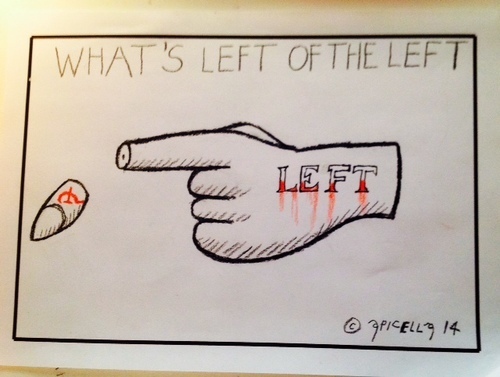Gilad Atzmon's Blog, page 20
December 8, 2014
Sleeping With Goyim in Mandatory Palestine
By Gilad Atzmon
source: http://whatsupic.com
Whatsupic -- In a superb video (attached below), Dr. Daniela Reich, an Israeli academic who specialises in ‘Israeli studies’ elaborates on her research into ‘Jewess / Goyim’ relationships within the context of pre 1948 Palestine.

The video points at two conflicting factors within the emerging pre-Israeli Hebraic society:
1. The Formal and conscious institutionalized utilization of young Jewish women to ‘befriend’ British Mandatory forces to promote the Zionist project and to collect intelligence.
2. A brutal harassment campaign against young women caught dating British mandatory soldiers and officers.
As usual, the Jewish anti Zionist ‘dissidents’ are very effective in providing juicy historical and factual anecdotes; yet, the nature of the culture that drives such phenomenon is left untouched and even concealed. Within the idiom of Jewish Left anti Zionist discourse, we are asked to condemn the symptoms but never to examine the disease. In this invaluable video, made by Israeli peace activist David Sheen, the Jewish culture and heritage that provoked such horrendous behavior toward women is left untouched. Interestingly, the video stops abruptly as soon as Dr Reich mentions the ‘J’ word.
I will briefly elaborate on the dialectics between female tribal utilization and deep Goy-hatred that are both embedded within Jewish culture.
From a Jewish tribal perspective, utilizing Jewish women and their charms to serve the Jewish cause is totally kosher. For many Jews, one of the most fascinating Biblical stories, that is also popular amongst feminists and LGBT enthusiasts, is the story of Queen Esther.
To read more: http://whatsupic.com/
December 7, 2014
Taboo Topics and Jewish Lobby talk by Henry Herskovitz and Greg Felton
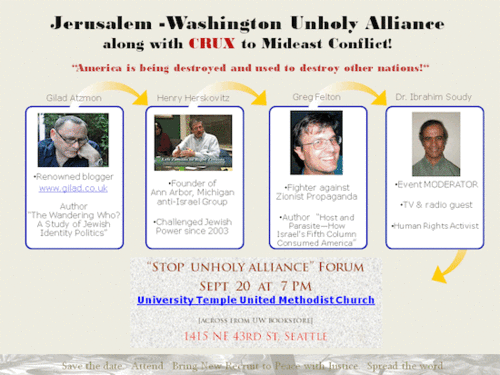
Henry Herskovitz addressed the Mideast Conflict Forum on September 20, 2014. After several visits to Palestine, Henry attempted to impart the harsh realities observed about Israel-Palestine to his Ann Arbor Jewish Community.
Three rabbis and two Jewish ladies of Ann Arbor, Phyllis and Lorrie, the later two headed the Palestine Peace Movement no less, thwarted his every effort. Clearly, there is an enforced TABOO against topics reflecting poorly on Israel or the Jewish Community.
Henry's unintended story, due to years of stonewalling, developed into one about Jewish Power. Henry shares his core discovery viz. Runaway Jewish Power - not Occupation or Zionism - vexes the globe.
Henry Herskovitz urges everyone to expose Jewish Power in order to diminish it!
Ann Arbor typifies dug-in DENIAL pervading Jewish Communities across America.
Greg Felton spoke next at the Mideast Conflict Forum. Greg authored "The Host and the Parasite" and speaks on Israel-Palestine.
Greg warned that LANGUAGE can be taken hostage and with it our thinking. He further ripped away religion from the troubles besetting the Mideast. It is Fascism coated with Chauvinism that accompanied Jewish émigrés to Palestine.
The creation of Israel - a monster later to enslave its creator - was reviewed as part compromise and part extortion. Truman faced "money, votes and strong-arm tactics" extraordinaire dished out by Organized American Jewry of the day. A New York Jew, and long-serving congressman, Emanuel Celler, Greg calls out for his ultimatums to Truman "Support Israel or we'll run you out of town!"
Ultimatums pale in comparison to an assassination plot.
According to Greg Felton [story by journalist Alison Weir http://www.ifamericansknew.org/us_ints/ob-assassinations.html] President George (Herbert) Bush Sr. was targeted for a Mossad hit 1991 in Madrid. A leak thwarted that plot in the nix of time. Former Stern Gang leader and then Israel prime minister Yitzhak Shamir wanted no genuine negotiations towards peace as conducted by President Papa Bush.
Greg summarizes that shared values little exist with Israel. He analogizes a "master-slave" existing relationship. We can only escape if we "opt out" of any Zionist mindset. Our attention he directs to barcode 729 that identifies products of Israel.
Boycott he urges!
How Genius are Jews? talk by Gilad Atzmon
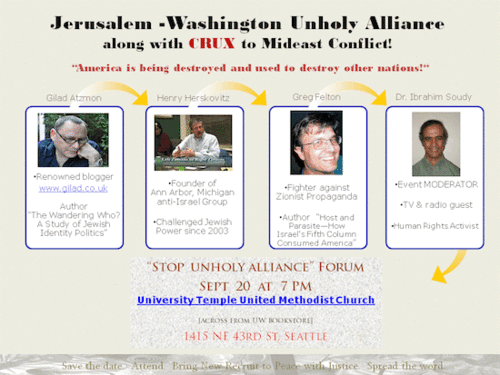
Gilad Atzmon, noted author and blogger, wrestles with popularized notion of JEWISH GENIUS. He confirms and traces "tribal eugenics" that led to a distinct Cognitive Elite among Jews quite a bit superior to other ethnicities.
Essentially, ghetto life compelled Jews to marry gifted boys with daughters' of rich merchants thereby combining "cleverness" with "money."
This fifteen hundred year experiment in eugenics bore fruit. Once liberated from Ghetto life following the French Revolution, Jewish Elites maneuvered to control Europe within forty short years.
Atzmon credits, as well, the Tribe's Focused Assistance to its Elites-in-the-making. Poverty was generally no obstacle to Ghetto Jews with talent obtaining a quality education.
Noteworthy, breeding an ELITE corps robbed the mass of Jewish non-elites of smarts. Moshe, Chaim, and Josef, he observed, can be painfully average - fit for labor only.
We see evidence of "Cognitive Ability + Sophisticated Clan Help" operative today. Media Mogul of Estonia was a moneyless talent made rich by Rothschild interests to control Jewish viewpoint in Estonia and beyond.
Another classic example would be Rupert Murdoch who started with a single, medium-sized Australian Newspaper then catapulted to Global Media Baron - again he enjoyed Rothschild backing.
This concept of Cognitive Elitism explains, in no small measure, why Jews occupy power posts and set policies for lesser-gifted Goyim.
This concept of Cognitive Elitism explains why Israel routinely targets for assassination Palestinian Leadership Talent! Killer drones quite literally keep Palestinians dumber and more subservient.
December 6, 2014
Chomsky According to Dershowitz
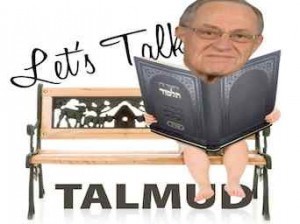
A unique moment in the history of Zionism - Dershowitz has been caught on camera telling the truth.
Listening to Alan Dershowitz, it is clear that the 'hawk' Dershowitz and the 'Left wing icon' Noam Chomsky agree on pretty much everything to do with the Jewish State and Palestine – “No” to the Palestinian Right Of Return, “yes” to two States ,”yes” to a Jewish State on Palestinian land, etc. Dershowitz is not lying, he truly represents Chomsky's position. The meaning is simple - the image of a 'Left/Right division' within the Jewish world is a dull spin. Jews agree amongst themselves on pretty much everything.
You can listen to the entire boring debate here: https://www.youtube.com/watch?v=3ux4JU_sbB0
December 5, 2014
ISISraHell
Gaza health ministry declares state of emergency
By Mohammed Omer

Ministry officials say basic services may soon be cut in medical centres across Gaza as a result of a severe funding shortage
GAZA CITY – The Gaza health ministry has announced a state of emergency in hospitals and medical centres across the besieged Palestinian enclave, as top officials warned that basic services may soon be cut as a result of dwindling medical supplies and unpaid wages.
Dr Yousef Abu Elrish, head of the higher committee for emergencies at the ministry, told a press conference in Gaza City on Wednesday that nutrition and cleaning services in hospitals, and ambulance services, may soon be halted across the strip.
Elrish said the Palestinian consensus government - formed in June between rival Palestinian factions, Hamas and Fatah - had not met its in responsibilities towards Gaza's health sector, failing to fund the day-to-day costs at Gaza's hospitals since June.
The health ministry needs $6.3 million each month to run and can only cover $400,000 of this total through revenues, according to its latest records which MEE reviewed.
The paralysed Palestinian political process has resulted in unpaid wages for approximately 50,000 public sector employees in Gaza, including doctors and other medical staff.
Over the past two months, cleaners at medical facilities in Gaza have complained about not receiving their salaries. On Wednesday, they held a protest and walked out of government hospitals in a one-day strike, leaving piles of garbage at several Gazan hospitals.
This is not the first time the cleaners have protested, but they said they will not return to work this time until they are paid.
Garbage and supplies were strewn across several Gaza hospitals on Wednesday (AA)
Umm Ibrahim lay on bed at the Emirati Red Crescent Maternity Hospital, one day after giving birth to her son. She told Middle East Eye that the cleaners had not worked since the morning she arrived.
"One can't live without the help of cleaners in hospitals and doctors can't treat and clean rooms at the same time," she said.
Gaza has suffered from a chronic shortage of medical supplies for several years, a situation that was exacerbated by Israel's 50-day assault on the territory over the summer. Ministry of health spokesman Ashraf al-Qudra said stocks for 120 medications and 470 types of medical supplies have entirely run out, including treatments for chronic diseases like kidney failure and liquids for blood analysis.
Palestinians in Gaza have also complained about long delays for surgical procedures.
One of those patients was Amal al-Arishi who was sitting in a corridor at Shifa Hospital on Thursday. Early in the morning, doctors told her that she was ready to give birth and they planned to do a caesarian section. But after they prepared her for the procedure, the doctors returned to tell her that the operation room was too unclean to be used to delivery new babies and she would have to wait.
Other patients who need surgery may wait for up to nine weeks, doctors said.
Dr Elrish warned that the coming days could see the complete closure to vital health facilities in Gaza, including Harazin Maternity Hospital, Beit Hanoun Hospital and Abu Yousef Al-Najjar Hospital, the only public facility which serves more than 170,000 people in the southern Gaza city of Rafah.
At Shifa Hospital, the largest hospital in the Strip, frustration was mounting as people attempted to register for operations on Wednesday, most of which were delayed. Pools of blood and used bandages covered the floors.
A Gaza-based minister, who said he preferred to remain anonymous as he coordinated discussion between Gaza and Ramallah, said Gazan politicians are concerned about the situation and have raised the issue with the leadership in Ramallah, but have yet to see concrete action.
Source: http://www.middleeasteye.net/
Gilad Atzmon Vindicated: The Jewish Supremacy of Jewish Voice for Peace

By Jonathan Azaziah (Mouqawamah Music EXCLUSIVE)
source: http://mouqawamahmusic.net/
There is an Eastern proverb that has been attributed to Arabs, Persians and Chinese that goes something along the lines of, “The dogs bark but the caravan passes on.” In this day and age, and when applied to the “Palestine Solidarity” scene, the proverb is perfectly applicable with just a scintilla of rewording: “The Anti-Zionist Zionists bark but Gilad Atzmon still passes through town and plays his gig.” Just a couple of months ago, the world-renowned, ex-Jewish, ex-“Israeli” saxophonist and author was in Texas for a show with gifted jazz musician, outspoken critic of Jewish supremacism and Mouqawamah Music co-founder Trevor LaBonte, when he was attacked by a man named Nick Cooper, a rather loathsome apologist for Jewish supremacism. Cooper put out a hit piece on Atzmon and tried virtually every trick in the Zionist playbook to shut down the event. Thankfully however, the Jewish tribalist activist failed in his ADL-like endeavors and the Atzmon performance at the Palestinian Layal restaurant in Houston was a packed-house success.
While an exceedingly detailed refutation could be written to counteract Cooper’s smears, there are only two points that will be addressed here. Firstly, Cooper seems exceedingly incensed that Atzmon doesn’t kowtow to the Jewish-leftist-driven narrative that Zionism is not in fact a unique brand of colonial domination and is merely an extension of what “The Left” calls “white supremacy” and “Christian imperialism”.
A simple grouping of questions for Mr. Cooper: Did the terrorist French regime set up an exclusivist “French state” in Algeria, Vietnam, Burkina Faso, Syria or Lebanon? What about the murderous British? Did the Crown ever declare Iraq, India, Kenya, Ghana or Hong Kong to be “the national homeland of the British people”? And what about genocidal Portugal? Was there a “Portuguese and democratic state” that came to fruition in Brazil, Mozambique or Angola? Of course not. Based on this premise alone, the usurping Zionist entity is undoubtedly a unique colonial project as it represents the evisceration of one culture and people — the Palestinians and Arabs more generally — and their subsequent replacement with another — the Jews — based on absurd, rewritten claims in the Jewish Bible. In other words, the engine which moves the Jewish supremacist colonization vehicle in Palestine is genocide justified by a Jewish cultural and quasi-religious doctrine.
Moreover, Cooper fails to note that Zionism isn’t just a project which seeks to eliminate the indigenous Arabs and dominate the land between the River and the Sea, or even between the Nile and Euphrates, it is a global project that spans the upper echelons of media, banking, entertainment, art and other culture-shaping “elite” sectors. This critical fact is even admitted by anti-Gentile racist Max Blumenthal, who declared, “In my own country, we Jewish-Americans have generally superseded the WASP’s as the new elite, as the new ‘whites.’ But unlike other white people in America, we are able to claim persecution when anyone challenges our privilege, and our claims of persecution will be taken very seriously.” Is this not the definition of unique? The only reason why Cooper attacks Atzmon for his honesty about the “specialness” of Zionism is because Atzmon offends Cooper’s and other anti-Zionist Zionists’ Jewish sensitivities.
The second and arguably more critical point to be made is that Cooper attacks Atzmon’s intellectual integrity by declaring he got his facts wrong about “pro-Palestine” groups IJAN and Jewish Voice For Peace (JVP). First Cooper quotes Atzmon: “If you are a Gentile (non-Jew), you cannot really join a Jewish anti-Zionist cell, because you are not racially qualified.” And then Cooper writes: “This is factually wrong — both groups have non-Jewish members.”
But in reality, it is Cooper who is factually incorrect. While anyone can technically become a “member” of JVP by simply joining its mailing list, when it comes down to who’s who and what’s what, we ponder, who’s running the show? In other words, to use Gilad’s phrase, who controls the “Jewish anti-Zionist cell” known as JVP? (Information on who is running the International Jewish Anti-Zionist Network [IJAN] could not be found oddly enough, or then again, maybe not so odd at all, as the organization most likely doesn’t want people to know its own Jewish-racialist-tribalist exclusive agenda)
All one has to do is look through JVP’s Staff & Board and then take a gander at its Advisory Board. As the cliche goes, the truth shall set you free. JVP’s Staff & Board is comprised of 27 Jews, including rabbis, which shows the Talmudic nature of the organization, along with one 1 Transgender who is presumably “half”-Jewish, and even if that is not the case, the Transgender person might as well be an honorary Jew as it is a widely known reality that Organized Jewish Interests are quite intimately and heavily involved in funding LGBT movements and causes, as evidenced by the support of the American Jewish World Service and neocon, vulture capitalist billionaire Paul Singer (who, interestingly enough, is also involved in the attempted overthrow of Argentine President and Jewish Lobby nemesis Cristina Fernandez de Kircher, a sign of his own commitment to Jewish identity politics). And JVP’s Advisory Board? More of the exclusivist, Jewish supremacist same. It is made up of 29 Jews, including rabbis, and not a single Gentile. Coincidentally, one of the advisers to JVP is the late Howard Zinn, so apparently, a dead Jew has more “advisory capabilities” in the eyes of JVP than actual living, breathing Palestinians or any other Arab, Muslim or Gentile for that matter.
So there it is. Gilad Atzmon stands vindicated and Nick Cooper is left with kosher egg on his face. JVP is run by Jews from top to bottom, without a single non-Jew to speak of. And as Gilad wrote, one cannot “really join” JVP and have a role on its board or in its leadership if one isn’t a Jew. Is this “hafrada”, this separation of Jew and Gentile, not the essence of Zionism, thus vindicating Atzmon’s categorization of these persons as anti-Zionist Zionists, i.e. Jews masquerading as anti-Zionists all for the sake of preserving Jewish interests and the illegitimate, baby-killing “Israeli” regime itself?
The Palestinian cause is a liberationist cause rooted in justice and righteousness and it has no place for persons such as JVP who inhibit the discourse and who are quite literally acting as Zionism’s thought police. As I noted in my Al-Quds anthem “Unstoppable March (Original Qibla)” off my new album “Enemy of the Entity”, a record dedicated to the beautiful people of Palestine and their precious cause, “We don’t need ‘leftist’ ‘Israelis’ or the Jewish Voice for ‘Peace’/Pretenders who say they’re our friends but don’t support our liberationist ends, yeah, that is stupid noise to me/We can see the scam from a mile away, we ain’t gonna act as their foolish goys or sheep/” It’s worth repeating: Gilad Atzmon stands vindicated and Jewish Voice for Peace is nothing but a front for Jewish supremacy, the very antithesis of the Palestinian cause and all it represents.
~ The End ~
Is it the Guardian Of Judea Or Just The Observer Of Zion?
GA: Being the subversive mind who coined the above observations, I wasn’t surprised to read the following expose by Nafeez Ahmed. I urge you to read this superb piece of Journalism. The Guardian is clearly a mere symptom of the colossal ethical bankruptcy of the ‘liberal’ and whatever is remaining of the Left. It is a glimpse into the Kosherization and the corrosive impact of Zionists in our midst.
‘Palestine is not an environment story’
source: https://medium.com
How I was censored by The Guardian for writing about Israel’s war for Gaza’s gas
By Nafeez Ahmed
After writing for The Guardian for over a year, my contract was unilaterally terminated because I wrote a piece on Gaza that was beyond the pale. In doing so, The Guardian breached the very editorial freedom the paper was obligated to protect under my contract. I’m speaking out because I believe it is in the public interest to know how a Pulitizer Prize-winning newspaper which styles itself as the world’s leading liberal voice, casually engaged in an act of censorship to shut down coverage of issues that undermined Israel’s publicised rationale for going to war.
Gaza’s gas
I joined the Guardian as an environment blogger in April 2013. Prior to this, I had been an author, academic and freelance journalist for over a decade, writing for The Independent, Independent on Sunday, Sydney Morning Herald, The Age, The Scotsman, Foreign Policy, The Atlantic, Quartz, Prospect, New Statesman, Le Monde diplomatique, among others.
On 9th July 2014, I posted an article via my Earth Insight blog at The Guardian’s environment website, exposing the role of Palestinian resources, specifically Gaza’s off-shore natural gas reserves, in partly motivating Israel’s invasion of Gaza aka ‘Operation Protective Edge.’ Among the sources I referred to was a policy paper written by incumbent Israeli defence minister Moshe Ya’alon one year before Operation Cast Lead, underscoring that the Palestinians could never be allowed to develop their own energy resources as any revenues would go to supporting Palestinian terrorism.
The article now has 68,000 social media shares, and is by far the single most popular article on the Gaza conflict to date. Contrary to the conventional wisdom, Israel has seen control of Gaza’s gas as a major strategic priority over the last decade for three main reasons.
Firstly, Israel faces a near-term gas crisis — largely due to the long lead time needed to bring Israel’s considerable domestic gas resources into production; secondly, Netanyahu’s administration cannot stomach any scenario in which a Hamas-run Palestinian administration accesses and develops their own resources; thirdly, Israel wants to use Palestinian gas as a strategic bridge to cement deals with Arab dictatorships whose domestic populations oppose signing deals with Israel.
Either way, the biggest obstacle to Israel accessing Gaza’s gas is the Hamas-run administration in the strip, which rejects all previous agreements that Israel had pursued to develop the gas with the British Gas Group and the Palestinian Authority.
Censorship in the land of the free
Since 2006, The Guardian has loudly trumpeted its aim to be the world’s leading liberal voice. For years, the paper has sponsored the annual Index on Censorship’s prestigious Freedom of Expression Award. The paper won the Pulitzer Prize for its reporting on the National Security Agency (NSA). Generally, the newspaper goes out of its way to dress itself up as standing at the forefront of fighting censorship, particularly in the media landscape. This is why its approach to my Gaza gas story is so disturbing.
The day after posting it, I received a phone call from James Randerson, assistant national news editor. He sounded riled and rushed. Without beating around the bush, James told me point blank that my Guardian blog was to be immediately discontinued. Not because my article was incorrect, factually flawed, or outrageously defamatory. Not because I’d somehow breached journalistic ethics, or violated my contract. No. The Gaza gas piece, he said, was “not an environment story,” and therefore was an “inappropriate post” for the Guardian’s environment website:
“You’re writing too many non-environment stories, so I’m afraid we just don’t have any other option. This article doesn’t belong on the environment site. It should really be on Cif [i.e. the Guardian’s online opinion section known as ‘Comment Is Free’].”
I was shocked, and more than a little baffled. As you can read on my Guardian profile, my remit was to cover “the geopolitics of environmental, energy and economic crises.” That was what I was commissioned to do — indeed, when I had applied in late 2012 to blog for The Guardian, an earlier piece I’d written on the link between Israeli military operations and Gaza’s gas in Le Monde diplomatique was part of my portfolio.
So I suggested to James that termination was somewhat of an overreaction. Perhaps we could simply have a meeting to discuss the editorial issues and work out together what my remit should be. “I’d be happy to cooperate as much as possible,” I said. I didn’t want to lose my contract. James refused point blank, instead telling me that my “interests are increasingly about issues that we don’t think are a good fit for what we want to see published on the environment site.”
In the end, my polite protestations got nowhere. Within the hour, I received an email from a rights manager at The Guardian informing me that they had terminated my contract.
Under that contract, however, I had editorial control over what I wrote on my blog — obviously within the remit that I had been commissioned for. From May to April, environment bloggers underwent training and supervision to ensure that we would eventually be up to speed to post on the site independently based on our own editorial judgement. The terms and conditions we signed up to under our contract state:
“You shall regularly maintain Your Blog and shall determine its content. You shall launch Your own posts which shall not be sub-edited by GNM. GNM occasionally might raise topics of interest with You suitable for Your Blog but You shall be under no obligation to include or cover such topics.”
The terms also point out that termination of the contract with immediate effect could only occur “if the other party commits a material breach of any of its obligations under this Agreement which is not capable of remedy”; or if “the other party has committed a material breach of any of its obligations under this Agreement which is capable of remedy but which has not been remedied within a period of thirty (30) days following receipt of written notice to do so.”
The problem is that I had committed no breach of any of my contractual obligations. On the contrary, The Guardian had breached its contractual obligation to me regarding my freedom to determine the contents of my blog, simply because it didn’t like what I wrote. This is censorship.
As the Index on Censorship points out, the “absence of direct state-sponsored, highly visible censorship, which prevails in many countries around the world, may contribute to the commonly held view that there is no censorship in this country and that it is not a problem.” However, “contemporary UK censorship, which sits within a liberal democracy” can come “in many different forms, both direct and indirect, some more subtle, some more overt.”
Invisible barriers
Ironically, a few days later, I was contacted by the editor of The Ecologist — one of the world’s premier environment magazines — who wanted to re-print my Gaza gas story. After publishing an updated version of my Guardian piece, The Ecologist also published my in-depth follow up in response to objections printed in The National Interest (ironically authored by a contractor working for a US oil company invested in offshore gas reserves overlapping the Gaza Marine). Obviously, having been expelled by The Guardian, I could not respond via my blog as I would normally have done.
That follow-up drew on a range of public record sources including leading business and financial publications, as well as official British Foreign Office (FCO) documents obtained under Freedom of Information. The latter confirmed that despite massive domestic gas discoveries in Israel’s own territorial waters, the inability to kick-start production due to a host of bureaucratic, technological, logistical and regulatory issues — not to mention real uncertainties in quantities of commercially exploitable resources — meant that Israel could face gas supply challenges as early as next year. Israel’s own gas fields would probably not be brought into production until around 2018-2020. Israeli officials, according to the FCO, saw the 1.4 trillion cubic meters of gas in Gaza’s Marine (along with other potential “additional resources” as yet to be discovered according to the US Energy Information Administration) as a cheap “stop-gap” that might sustain both Israel’s domestic energy needs and its export ambitions until the Tamar and Leviathan fields could actually start producing.
By broaching such issues in The Guardian, though, it seems I had crossed some sort of invisible barrier — that this topic was simply off-limits.
Energy is part of the environment, wait, no it isn’t, not in Palestine anyway
To illustrate the sheer absurdity of The Guardian’s pretense that a story about Gaza’s gas resources is “not a legitimate environment story,” consider the fact that just weeks earlier, Adam Vaughan, the editor of the Guardian’s environment website, had personally assented to my posting the following story: ‘Iraq blowback: Isis rise manufactured by insatiable oil addiction — West’s co-optation of Gulf states’ jihadists created the neocon’s best friend: an Islamist Frankenstein.’
Proposed headlines for stories that environment bloggers work on are posted on a shared Google spreadsheet so that editors can keep track of what we’re doing and planning to publish. Adam had seen my proposed headline and requested to see the draft on the 16th June: “… would you mind sending this one by me on preview, please, before publishing? Just conscious it’s very sensitive subject,” he wrote in an email.
I sent him the full article with a summary of what it was about. Later in the day, I pinged him again to find out what he thought, and he replied: “thanks, sorry, yes — I think it’s fine.”
So an article about ISIS and oil addiction is “fine,” but a piece about Israel, Gaza and conflict over gas resources is not. Really? Are offshore gas resources not part of the environment? Apparently, for The Guardian, not in Palestine, where Gaza’s environment has been bombed to smithereens by the IDF.
The Blair factor
Meanwhile, the Israel-Gaza gas saga continues. Just over a week ago, Ha’aretz carried some insightful updates on the strategic value of the whole thing. Quoting Ariel Ezrahi, energy adviser to Quartet Middle East envoy Tony Blair (the Quartet representing the US, UN, EU and Russia), Ha’aretz noted that there was a reason why Jordan — which had recently signed an agreement with Israel to purchase gas from its Leviathan field — had simultaneously announced that it intended to purchase gas from Gaza. As Israel attempts to reposition itself as a major gas exporter to regional regimes like Egypt and Turkey, the biggest challenge is that “it’s very hard for them to sign a gas contract with Israel despite their desperate need,” due to how unpopular such a move would be with their domestic populations.
“If I were Israel’s prime minister,” Blair’s energy adviser said, “I’d think how I could help the neighboring countries extricate themselves from the jam, and if Israel closes the Palestinian gas market, that’s not a smart thing.” So Israel has to find a way to open the Palestinian gas market and integrate it into the emerging complex of Israeli export deals: “… it would be wise for Israel to at least consider the contribution of the Palestinian dimension to these deals,” said Ezrahi. “I think it’s a mistake for Israel to rush into regional agreements without at least considering the Palestinian dimension and how it can contribute to Israeli interests.”
Israel, backed by its allies in the west, wants to use the Palestinians “as an asset as they strive to join the regional power grid, and as a bridge to the Arab world,” by selling Palestinian “gas to various markets,” or promoting a deal with the corporations developing Israel’s “Tamar and Leviathan [fields] that will allow for the sale of cheap gas to the [Palestinian] Authority.”
But there is a further challenge when considering the Palestinian dimension, namely Hamas: “I can’t meet with people linked to Hamas,” said Blair’s energy adviser. “It’s a very firm ban dictated by the Quartet. [emphasis added] The Americans don’t enter Gaza either.” So it is not just Israel that has ruled out any gas deal with the Palestinians involving Hamas. So have the US, EU, UN and Russia.
But Israel has no mechanism to eliminate Hamas from the Gaza strip — except, as far as Moshe Ya’alon is concerned, military action to change facts on the ground.
Over the 70 odd articles I’d written for The Guardian, not a single piece falls outside the subject matter I had been commissioned to write on: the geopolitics of interconnected environment, energy and economic crises. The conclusion is unavoidable: The Guardian had simply decided that resource conflicts over the Occupied Territories should not receive coverage. It should be noted that before my post, the paper had never before acknowledged a link between IDF military action and Gaza’s gas. Now that I’m gone, I doubt it will ever be covered again.
Well, at least Ya’alon, and his boss Netanyahu, will be happy.
Not to mention Tony Blair.
Liberal gatekeeping
When I began speaking in confidence to a number of other journalists inside and outside The Guardian about what had happened to me, they all consistently told me that my experience — although particularly outrageous — was not entirely unprecedented.
A senior editor of a national British publication who has written frequently for The Guardian’s opinion section, told me that he was aware that all coverage of the Israel-Palestine issue was “tightly controlled” by Jonathan Freedland, the Guardian’s executive editor for opinion.
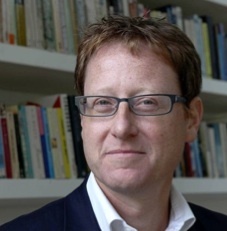
Jonathan Freedland is the Guardian’s executive editor for opinion
Another journalist told me that a Guardian editor commissioned a story from him discussing the suppression of criticism of Israel in public discourse and media, but that Freedland rejected the story without even reviewing a draft.
Several other journalists I spoke to inside and outside The Guardian went so far as to describe Freedland as the newspaper’s unofficial ‘gatekeeper’ on the Middle east conflict, and that he invariably leaned toward a pro-Israel slant.
These anecdotes have been publicly corroborated by Jonathan Cook, a former Middle East staff reporter, foreign editor and columnist for The Guardian, who is currently based in Nazareth where he has won several awards for his reporting. A profile of Cook at the progressive Jewish news site Mondoweiss points out that a key turning point in Cook’s career occurred in 2001 when he had just returned from Israel, having conducted an investigation into the murder of 13 non-violent Arab protestors by Israeli police during the second intifada the year before.
The police, Cook found, had executed a “shoot-to-kill policy” against unarmed victims — as was eventually confirmed by a government inquiry. But The Guardian suppressed his investigation, and chose not to run it at all. Cook says that while the paper does contain some exemplary reporting and insights, and even goes out of its way to condemn the occupation, there are certain lines that simply cannot be crossed, such as questioning Israel’s capacity to define itself as simultaneously an exclusively Jewish and democratic state, or critiquing aspects of its security doctrine.
Cook’s scathing criticism of his former paper in a 2011 Counterpunch article is highly revealing, and relevant, for understanding what happened to me:
“The Guardian, like other mainstream media, is heavily invested — both financially and ideologically — in supporting the current global order. It was once able to exclude and now, in the internet age, must vilify those elements of the left whose ideas risk questioning a system of corporate power and control of which the Guardian is a key institution.
The paper’s role, like that of its rightwing cousins, is to limit the imaginative horizons of readers. While there is just enough leftwing debate to make readers believe their paper is pluralistic, the kind of radical perspectives needed to question the very foundations on which the system of Western dominance rests is either unavailable or is ridiculed.”
Last month, Cook highlighted ongoing subtle but powerful insensitivities of language employed by The Guardian coverage’s of the Gaza crisis which, in effect, served to “disappear” the Palestinians. He specifically identified Freedland as a major player in this phenomenon. “The Guardian’s pride” in having helped create Israel is “still palpable at the paper (as I know from my years there),” especially among certain senior editors there “who influence much of the conflict’s coverage — yes, that is a reference to Jonathan Freedland, among others.”
===
UPDATE 4th Dec 2014 (10.13AM): Jonathan Freedland has offered a response this morning via TwitLonger, as follows:
“Your piece for Medium implies I was involved in the end of your arrangement with the Guardian. I don’t wish to be rude, but I had literally not heard of you or your work till seeing that Medium piece, via Twitter, a few hours ago. (The Guardian environment website, where you wrote, is edited separately from the Guardian’s Comment is Free site, which I now oversee.) I had no idea you wrote for the Guardian, no idea that arrangement had been terminated and not the slightest knowledge of your piece on Gaza’s gas until a few hours ago. What’s more, I was abroad — on vacation — on the days in July you describe. To put it starkly, my involvement in your case was precisely zero. I hope that as a matter of your own journalistic integrity, you’ll want to alter the Medium piece to reflect these facts. Perhaps you’ll also share this on Twitter as widely as you shared the Medium piece yesterday.”
However, Freedland’s reading of this piece is incorrect. I am not implying that Freedland was “involved” in the end of my Guardian tenure. I have no clue about that, and to be sure, I did not make any such claim above.
My simple point is that my experience of egregious Guardian censorship over the Gaza gas story — which Freedland does not address beyond denying his involvement — has a long and little-known context, suggesting that rather than my experience being a mere bizarre and accidental aberration, it is part of an entrenched, wider culture across the paper of which Freedland himself has allegedly played a key role in fostering.
It is not my fault that the range of journalists I spoke to all described Freedland as the Guardian’s resident unofficial “gatekeeper” on Israel-Palestine coverage. Notably, Freedland fails to address their allegations that he has previously quashed stories which are critical of Israel on ideological grounds rather than reasons of ‘journalistic integrity.’
END
===
This is perhaps not entirely surprising. A book commissioned by The Guardian, Disenchantment: The Guardian and Israel, by Daphna Baram, documents clearly the connection between the newspaper and Zionism, noting for instance that Guardian editor CP Scott had been central to the negotiations with the British government resulting in the Balfour Declaration and the very conception of the state of Israel. Her conclusion is that despite becoming increasingly critical of the occupation after 1967, The Guardian remains staunchly pro-Zionist, its staff devoting “inordinate time and effort” to ensure “fairness to Israel.”
Toward a media revolution
The Guardian, quite rightly, has a reputation for breaking some of the most important news stories of the decade — among them, of course, playing a lead role in releasing Edward Snowden’s revelations about mass surveillance and related violations of civil liberties. Yet hidden in the cracks of this coverage is the fact that while disclosing critical facts, The Guardian has been unable to raise the most fundamental and probing questions about the purpose and direction of mass surveillance, why it has accelerated, what motivates it, and who benefits from it.
Questions must therefore be asked as to why a newspaper that sees itself as the global media’s bastion of liberalism, has engaged in such grievous censorship by shutting down coverage of environmental geopolitics — a phenomenon which is increasingly at the heart not just of conflict over the Occupied Territories, but of the chaos of world affairs in the 21st century.
If this is the state of The Guardian, undoubtedly one of the better newspapers, then clearly we have a serious problem with the media. Ultimately, mainstream media remains under the undue influence of powerful special interests, whether financial, corporate or ideological.
Given the scale of the converging crises we face in terms of climate change, energy volatility, financial crisis, rampant inequality, proliferating species extinctions, insane ocean acidification, food crisis, foreign policy militarism, and the rise of the police-state — and given the bankruptcy of much of the media in illuminating the real causes of these crises and their potential solutions, we need new reliable and accountable sources of news and information.
We need new media, and we need it now.
As print newspapers go increasingly into decline, the opportunity for new people-powered models of independent digital media is rising exponentially. That’s why I’ve launched a crowdfunder to help support my journalism, and to move toward creating a new investigative journalism collective that operates in the public interest, precisely because it is funded not by corporations or ideologues, but by people. If we can create new journalism platforms that are dependent for their survival on citizens themselves, then it is in the interests of citizens that those platforms will function. Until then, fearless, adversarial investigative journalism will always be in danger of being shut down or compromised.
I believe that together, we can create a new people-powered model of journalism that will make the old, hierarchical media conglomerates dominated by special interests and parochial paternalistic visions of the world obsolete. So, if you like, pop along to my Patreon.com crowdfunder for INSURGE INTELLIGENCE, a truly independent people-powered investigative journalism collective that will remain dedicated to breaking the big stories that matter, no matter what. Pledge as little or as much as you like, and join the coming media revolution☺
Dr Nafeez Ahmed is an investigative journalist, bestselling author and international security scholar. Formerly of The Guardian, he writes the ‘System Shift’ column for VICE’s Motherboard, and is the winner of a 2015 Project Censored Award for Outstanding Investigative Journalism for his Guardian work. He is the author of A User’s Guide to the Crisis of Civilization: And How to Save It (2010), and the scifi thriller novel ZERO POINT , among other books.
December 4, 2014
The Jewish State and Gilad Atzmon
Book Review: The Wandering Who? - A Study of Jewish Identity Politics by Gilad Atzmon, Zero Books, 2011
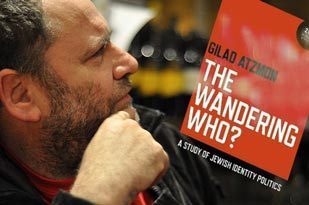
Zionism has failed for various reasons. Zionism could never have prevailed. It has been entangled with an endless list of sins from day one.
- Gilad Atzmon, The Wandering Who?
Gilad Atzmon is a gifted and articulate Israeli dissident who presents a rather grim but realistic prognosis of Zionism and the Jewish state in his book, The Wandering Who? – A Study of Jewish Identity Politics. Atzmon’s critique of Jewish identity politics, Zionism, and Israel is timely reading given the collapse of the Israeli government over a controversial law that would redefine the State of Israel as "the nation-state of the Jewish people.”
The fundamental question about the proposed “Jewish state” law is this: Will it promote peace? Given the violent reaction to the proposal of the bill it seems obvious that it will not solve any of the pressing political problems in Palestine and would only exacerbate the very real tension between Jews and Palestinians in the Holy Land if it were adopted into law.
According to Atzmon, it is precisely the ethno-centric notion that Israel should be “the Jewish state” which prevents it from being a normal and peaceful nation:
Israel is the Jewish state and Jewishness is an ethno-centric ideology driven by exclusiveness, exceptionalism, racial supremacy and a deep inherent inclination toward segregation. For Israel and Israelis to become people like other people, all traces of Jewish ideological superiority must be eliminated first. For the Jewish state to lead a peace initiative, Israel must be de-Zionised – it should first stop being the Jewish State.
I happened to meet Gilad Atzmon when our paths crossed in Portland, Oregon, in September. I had the chance to talk to him and wanted to ask him if he was related to Menachem Atzmon, the key Israeli defendant in the 9-11 tort litigation. Gilad was quick to answer and said that he is indeed related to Menachem Atzmon.
Menachem Atzmon is a former Likud party co-treasurer who, along with Ehud Olmert was charged with illegal campaign financing in Israel. Although Atzmon had been working with Ehud Olmert, Atzmon was convicted while Olmert was not. Olmert, the former mayor of Jerusalem and prime minister, has since been convicted and sentenced to prison on other charges involving accepting illegal funds.
Atzmon went on to head an Israeli security company called International Consultants on Targeted Security (ICTS), which is based in Holland. ICTS happens to be the parent company of Huntleigh USA, the former American company that managed passenger screening operations at Boston’s Logan Airport on 9-11. ICTS was the key defendant in the 9-11 tort litigation but was excused from the process by a decision of the federal judge Alvin K. Hellerstein. It should be noted that there was a blatant conflict of interest in Judge Hellerstein’s management of the 9-11 tort litigation. While Judge Hellerstein was overseeing the tort litigation, his son, Joseph, was living in Israel (on an illegal settlement) and working in a law firm that represented the parent company of ICTS.
Gilad not only confirmed that he was related to Menachem Atzmon, but added that he is also related to Nathan Friedman-Yellin (a.k.a. Nathan Yellin-Mor) the Zionist activist from Grodno who worked closely with Avraham Stern and migrated to Palestine in 1941 to found LEHI, the radical Jewish terrorist group also known as the Stern Gang.
After Stern's death, Yellin-Mor became the political leader of LEHI along with Yitzhak Shamir (operations) and Israel Eldad (propaganda). Yellin-Mor was one of the planners of the assassination in Cairo of Lord Moyne, the British minister of state in the Middle East, in November 1944. Yellin-Mor was also found guilty of “leadership of a terrorist organization” after LEHI assassins murdered the Swedish Count Folke Bernadotte, who was serving as United Nations emissary in Jerusalem in September 1948. Although Yellin-Mor and LEHI member Matityahu “Matty” Shmuelevitz were found guilty on January 25, 1949, and Yellin-Mor was sentenced to 8 years imprisonment, both terrorists were pardoned shortly after the trial.
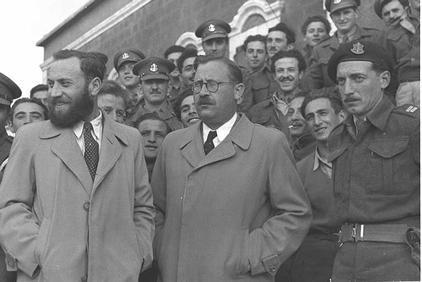
TERRORIST ASSASSINS Nathan (Friedman) Yellin-Mor (center) and Matty Shmuelevitz (left) in 1949 after being pardoned for having murdered the Swedish Count Folke Bernadotte, the UN special envoy to Palestine, in September 1948. Yellin-Mor then joined the first Knesset (government) of Israel. Shmuelevitz shares the family name with the mother of Rahm Emanuel. Emanuel's father, Benjamin (Auerbach) Emanuel, was also a member of the terrorist LEHI group and married Marsha Smulevitz. There is a resemblance in the face of Matty and Rahm Emanuel. Shmuelevitz went on the be the chief-of-staff for Menachem Begin.
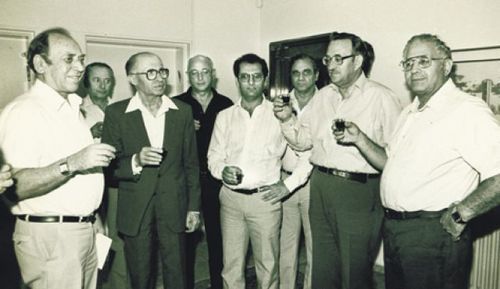
Matty Shmuelevitz served as the "director general" of Begin's office. I would guess that Matty is the man on the far left in this photo from 1983. At this point the plans for 9-11 had already begun and the stage was being set in the United States for the biggest false-flag terror attack in history. If Rahm Emanuel is related to Matty Shmuelevitz, as I suggest, then we can understand the role Emanuel played in setting the stage during the Clinton administrations, when he served as a special advisor to the president.
So, when Gilad Atzmon says that Zionism has “been entangled with an endless list of sins from day one,” he knows what he is talking about. He does not hide the fact that he was raised in a family that is tied to Jewish terrorism. As he says in the opening lines of his book:
My grandfather was a charismatic, poetic, veteran Zionist terrorist. A former prominent commander in the right-wing Irgun terror organization…
His family's relationship to Zionist terrorism gives Gilad Atzmon’s perspective an authenticity that is lacking in much of the literature about Zionism and Israel. Atzmon is more than just another critical Israeli who grew up during the time of the Six-Day War (1967), the Yom Kippur War (1973), and the invasion of Lebanon (1982) – his ancestors are among the key terrorists behind the creation of the state of Israel and, as we now know, one of his relatives played a key role in the false-flag terrorism of 9-11.
Atzmon’s insights about Israel and Jewish identity politics come from a dissident who was raised in a family of dedicated Zionists. This is why I think his critique of Zionism is one of the essential books of our time. Most Americans have very little, if any, understanding of what Zionism means in reality although their government is the most important financier and political supporter of the “Jewish state.” This lack of understanding is intentional, of course. The history of Israel is not taught in our universities and our controlled media presents an utterly false image of what Zionism is all about.
If the history of Zionism were taught at our universities, Atzmon’s book would certainly be on the reading list because it is the voice of an honest and articulate Israeli dissident:
As a young Israeli I believed in the Zionist ethos, I regarded myself an inherent part of the Jewish modern revival project. I saw myself as part of Jewish history, and Jewish history as an extension of myself. As a young Israeli growing up in the post-1967 era, I saw myself and the people around me as an evolving collective consciousness, fighting a revolutionary battle for historic justice…
As a young secular Israeli Jew, I believed enthusiastically in the possibility of transformation of the Jewish character into a ‘civilised, authentic humanist collective’. I believed myself to be one. I then grasped, through a long and painful process that Israel wouldn’t bring about a humanist Jew. It was entangled in a colossal sin and it was far too arrogant to save itself from its doomed circumstances.
Although the U.S. government is the primary supporter of the state of Israel and the assembled members of Congress gave twenty-nine standing ovations to its extreme right-wing prime minister, most Americans, Jews and Gentiles alike, function with “an imaginary Israel” in their mind, something that they want to believe in, but which bears no resemblance to reality. As I often say about naïve apologists for Israel: They simply do not understand the nature of the beast.
This is why I find the following extract from Atzmon’s book to be the most important. It explains in plain English the essence of “the Jewish state”:
One may be left perplexed on learning that just three years after the liberation of Auschwitz (1945) the newly-formed Jewish state ethnically cleansed the vast majority of the indigenous population of Palestine (1948). Just five years after the end of World War Two, the Jewish state brought to life racially-discriminatory return laws in order to prevent the 1948 Palestinian refugees from coming back to their cities, villages, fields and orchards. These laws, still in place today, were not categorically different from the notorious Nazi Nuremberg Laws.
These are the essential facts about “the Jewish state” that need to be taken into consideration when we discuss the state of Israel. The well-written Atzmon critique is contained in a small book of about 200 pages yet he manages to deftly handle all of the main issues of Jewish identity politics and Zionism with intelligence and humor.
There is one point where Atzmon and I do not agree. In several places he says, “I do not believe in Jewish conspiracies; everything is done in the open." I, on the other hand, think that a great deal of Zionist planning is done in secret societies, like the B’nai B’rith, the parent organization of the Anti-Defamation League (ADL) and Hillel. The Zionist planning of the false-flag terrorism of 9-11, for example, was clearly done behind closed doors in a secret society where oaths of secrecy have been sworn. Such secret societies exist for a reason and secrecy is the most important aspect of such organizations.
I asked Gilad about this statement and told him that my reading of Zionist history revealed that secret societies like the B'nai Moshe, B'nai B'rith, and others, played key roles in creating the Zionist fervor in Eastern Europe in the late 1800s and beyond. One source in particular, the Encyclopedia of Zionism and Israel, by Raphael Patai, Herzl Press, 1971, has many articles about these secret societies.
He wrote back agreeing that this “could be an open subject to debate.”
Sources: Atzmon, Gilad, The Wandering Who? - A Study of Jewish Identity Politics, Zero Books (UK), 2011
"Begin's legacy: 'Yehiel, it ends today' - The day that Menachem Begin announced he would resign as prime minister," by Shlomo Nakdimon, Ha'aretz (Israel), February 22, 2012
http://www.haaretz.com/weekend/magazine/begin-s-legacy-yehiel-it-ends-today-1.414173
"Bollyn meets Gilad Atzmon" by Christopher Bollyn, September 23, 2014
bollyn.com/bollyn-meets-gilad-atzmon/
"Gilad Atzmon Confirms Shaul Eisenberg Connection to ICTS" by Christopher Bollyn, November 6, 2014
www.bollyn.com/gilad-atzmon-confirms-shaul-eisenberg-connection-to-icts/
- See more at: http://www.bollyn.com/14973#sthash.Pw...

